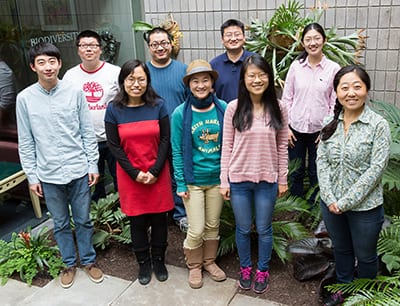News
Extra DNA Creates Cucumber with All-Female Flowers
Cucumber plants are not simply male or female. They can be seven different sexes, depending on a complex mix of genetic and environmental factors. Some high-yield cucumber varieties produce only female flowers, and a new study identifies the gene duplication that causes this unusual trait.
The study, led by Zhangjun Fei of the Boyce Thompson Institute at Cornell University in Ithaca, New York, and Sanwen Huang of the Chinese Academy of Agricultural Sciences, in Beijing, appears May 22, 2015 in The Plant Cell.
Ask a plant researcher how the sex of a cucumber plant is determined and the person probably will tell you, “It’s complicated.” Cucumbers can produce female flowers with stigmas, male flowers with anthers or bisexual flowers with both. But because a cucumber plant can produce any or all of these different flower types, there are seven different sexes. This complex system has made cucumbers the species of choice for studying sex determination in plants.
Dutch breeders take advantage of “gyneoecious” varieties that produce only female flowers. When grown in nutrient-rich, soil-free greenhouses they produce a cucumber from each flower, greatly increasing the yield over “monoecious” varieties that produce both types of flowers. The female flowers must be fertilized by pollen from a male flower, but by controlling the sex ratio, growers can greatly increase their harvest.

Members of Fei Lab at Boyce Thompson Institute, from left to right, Visiting Scholar Wenli Liu, Postdoctoral scientists Yi Zheng, Research assistant Qiyua Ma, Bioinformatics analyst Honghe Sun, Postdoctoral scientist Wenbo Chen, Associate Professor Zhangjun Fei, Visiting scholar Mingyue Zhang, Postdoctoral scientist Yang Bai, Visiting scholar Xiaofang Wang
“If you compare the greenhouse production in the Netherlands, which uses plants with female flowers, to China, where they use monoecious plants and normal agricultural practices, the production in the Netherlands is about 15 times greater than in China,” said Fei. He explained that farmers in China do not plant gynoecious cucumbers because the nutrition in the soil is not sufficient for fruits to develop at each flower.
Though researchers have known since the 1960s that there was a genetic cause for all-female flower-bearing plants, the exact location and sequence of the responsible segment of DNA was previously unknown.
The researchers discovered the extra DNA by screening genome sequences from a core collection of 115 different cucumber lines. They looked for changes called structural variations—large regions of the genome that are missing, added, reversed or duplicated. They generated a map of the 26,778 different structural variations that they found, some of which are associated with cucumber domestication. The analyses show that collectively, these structural variations affect more than 1,600 genes in the cucumber genome.
“It turns out that we found this one specific structural variation that is a duplication of about 30,000 bases. The duplication was highly correlated with gynoecy,” said Fei. “For female flowered-plants, there’s a lot of potential for agricultural production.”
The study builds off of previous work by Fei, Huang and colleagues, who collaborated in sequencing the initial cucumber genome and later published a paper that identified single base differences called SNPs, between multiple cucumber lines.
Additional researchers from the Boyce Thompson Institute who worked on the project include Linyong Mao, a postdoctoral researcher formerly from the Fei laboratory as well as bioinformatics analyst Honghe Sun, visiting student Chen Jiao and summer intern undergraduate student Rachel Blakely.


